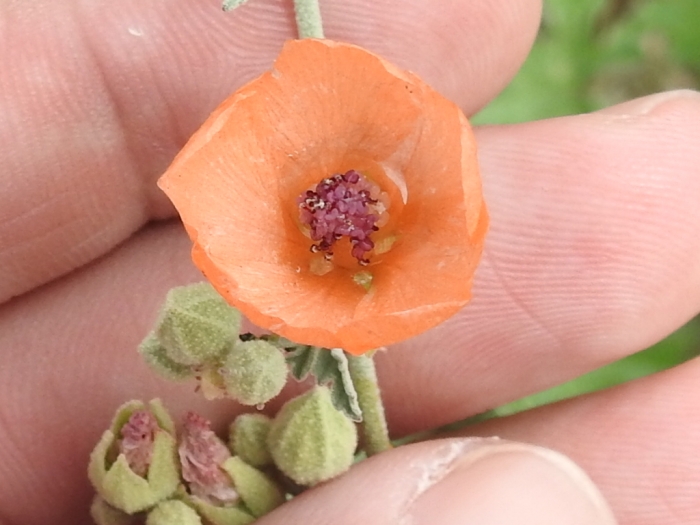Caliche Globemallow
(Sphaeralcea laxa)
Caliche Globemallow (Sphaeralcea laxa)
/
/

Sam Kieschnick
CC BY 4.0
Image By:
Sam Kieschnick
Recorded By:
Copyright:
CC BY 4.0
Copyright Notice:
Photo by: Sam Kieschnick | License Type: CC BY 4.0 | License URL: http://creativecommons.org/licenses/by/4.0/ | Rights Holder: Sam Kieschnick | Publisher: iNaturalist | Date Created: 2017-08-19T23:28:58-07:00 |















Estimated Native Range
Summary
Sphaeralcea laxa, commonly known as Caliche Globemallow, is a perennial subshrub or herb native to arid and semi-arid regions, including desert scrub, grasslands, and open woodlands in the Southwestern United States and Northern Mexico. It typically grows to a height and width of 1-3 feet (0.3-0.9 meters). This plant is characterized by its rounded form and small, lobed leaves, with a profusion of cup-shaped, orange flowers that bloom from spring to fall, providing a long season of visual interest.
Caliche Globemallow is valued for its drought tolerance and ability to thrive in challenging conditions, making it an excellent choice for xeriscaping and naturalistic plantings. It is also used for erosion control and as a pollinator-friendly plant, attracting bees and butterflies. In cultivation, it requires minimal maintenance, preferring full sun exposure and well-drained soils, particularly those with a gravelly or sandy texture. While it is not commonly afflicted by diseases, overwatering can lead to root rot. Gardeners should be cautious of its potential to self-seed and spread if conditions are favorable.CC BY-SA 4.0
Caliche Globemallow is valued for its drought tolerance and ability to thrive in challenging conditions, making it an excellent choice for xeriscaping and naturalistic plantings. It is also used for erosion control and as a pollinator-friendly plant, attracting bees and butterflies. In cultivation, it requires minimal maintenance, preferring full sun exposure and well-drained soils, particularly those with a gravelly or sandy texture. While it is not commonly afflicted by diseases, overwatering can lead to root rot. Gardeners should be cautious of its potential to self-seed and spread if conditions are favorable.CC BY-SA 4.0
Plant Description
- Plant Type: Subshrub, Herb
- Height: 1-3 feet
- Width: 1-3 feet
- Growth Rate: Moderate
- Flower Color: Orange
- Flowering Season: Spring, Summer, Fall
- Leaf Retention: Deciduous
Growth Requirements
- Sun: Full Sun
- Water: Low
- Drainage: Fast
Common Uses
Bee Garden, Bird Garden, Drought Tolerant, Hummingbird Garden, Low Maintenance, Potted Plant
Natural Habitat
Arid and semi-arid regions, including desert scrub, grasslands, and open woodlands
Other Names
Common Names:
Scientific Names: , Sphaeralcea laxa, Sphaeralcea incana var. dissecta, Sphaeralcea fendleri var. dissecta, Sphaeralcea incana f. dissecta, Sphaeralcea ribifolia,
GBIF Accepted Name: Sphaeralcea laxa Wooton & Standl.